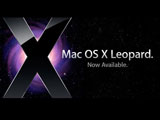If we were to compare the MacOS X Leopard to a car, it would have to be a supercar like a Ferrari, or at least the Toyota Hilux featured on Top Gear (the one that was impossible to kill). The simple truth of the matter is that Leopard is not affected by things such as performance losses, malware, inexplicable crashes and all the other annoying bits and pieces we've come to expect from other operating systems.
There is no denying that Leopard is amongst the best operating systems ever to be created (up to this point in time at least). Still, there are a few tasks that you can perform, which will ensure it runs as smoothly as it possibly can. Compare yourself to the car fanatic that just got a Ferrari but still pops the hood because he knows he can make it run just a little bit faster.
If you spend a lot of time in front of your computer, try to reboot every once in a while. The reasoning behind this is rather simple: every time you reboot, you allow the OS to run system file checks, delete temporary files, and reconnect to the hardware.
Most users tend to forget that software needs to be updated regularly. This applies to the operating system as well as for all the various programs you have installed on it. The main purpose of an update is to fix bugs and security vulnerabilities within the software, as well as add new features to it.
Another thing that you could do is to perform hard drive health checks. It is also a good idea to leave a bit of free space on the hard hard drive - keep in mind that Leopard uses the hard drive as a source of memory. This means that the amount of free space you have on it directly influences the performance of the OS. Since we are on the topic of hard drives, it is also a good idea to defrag it every once in a while.
These tasks, although not incredibly difficult to perform, are most of the times overlooked by the users. Some of them do not even allow the maintenance scripts to run, or even delete cache files.
There is no denying that Leopard is amongst the best operating systems ever to be created (up to this point in time at least). Still, there are a few tasks that you can perform, which will ensure it runs as smoothly as it possibly can. Compare yourself to the car fanatic that just got a Ferrari but still pops the hood because he knows he can make it run just a little bit faster.
If you spend a lot of time in front of your computer, try to reboot every once in a while. The reasoning behind this is rather simple: every time you reboot, you allow the OS to run system file checks, delete temporary files, and reconnect to the hardware.
Most users tend to forget that software needs to be updated regularly. This applies to the operating system as well as for all the various programs you have installed on it. The main purpose of an update is to fix bugs and security vulnerabilities within the software, as well as add new features to it.
Another thing that you could do is to perform hard drive health checks. It is also a good idea to leave a bit of free space on the hard hard drive - keep in mind that Leopard uses the hard drive as a source of memory. This means that the amount of free space you have on it directly influences the performance of the OS. Since we are on the topic of hard drives, it is also a good idea to defrag it every once in a while.
These tasks, although not incredibly difficult to perform, are most of the times overlooked by the users. Some of them do not even allow the maintenance scripts to run, or even delete cache files.

























